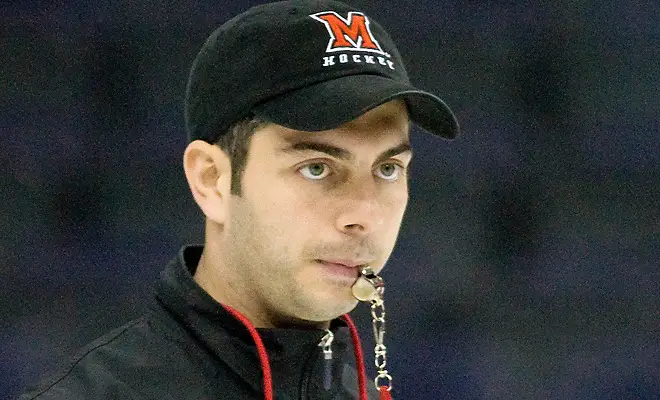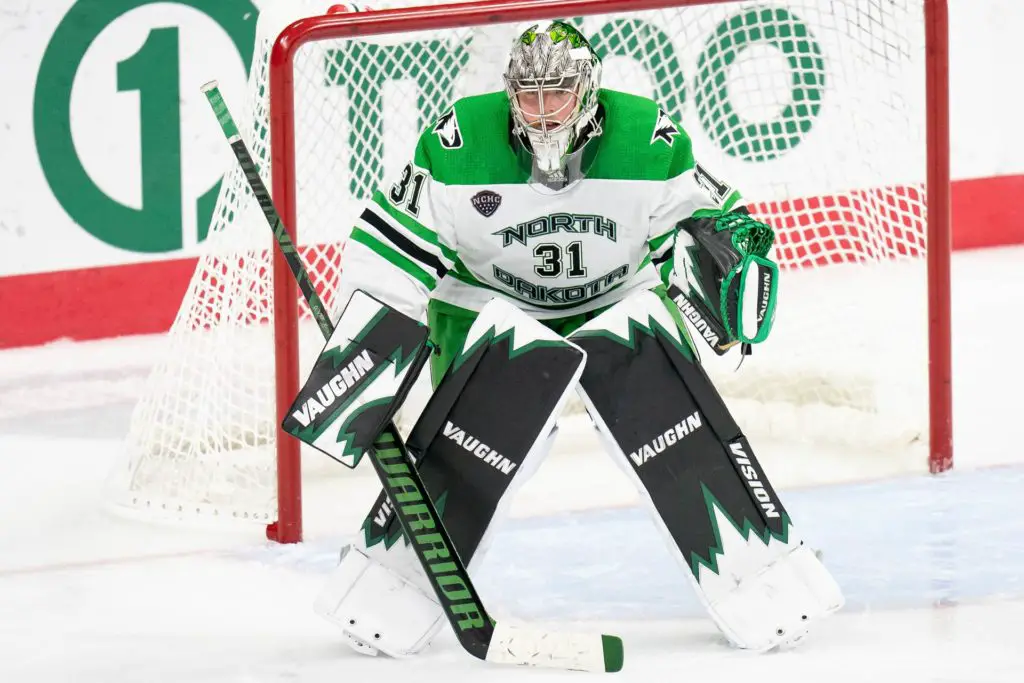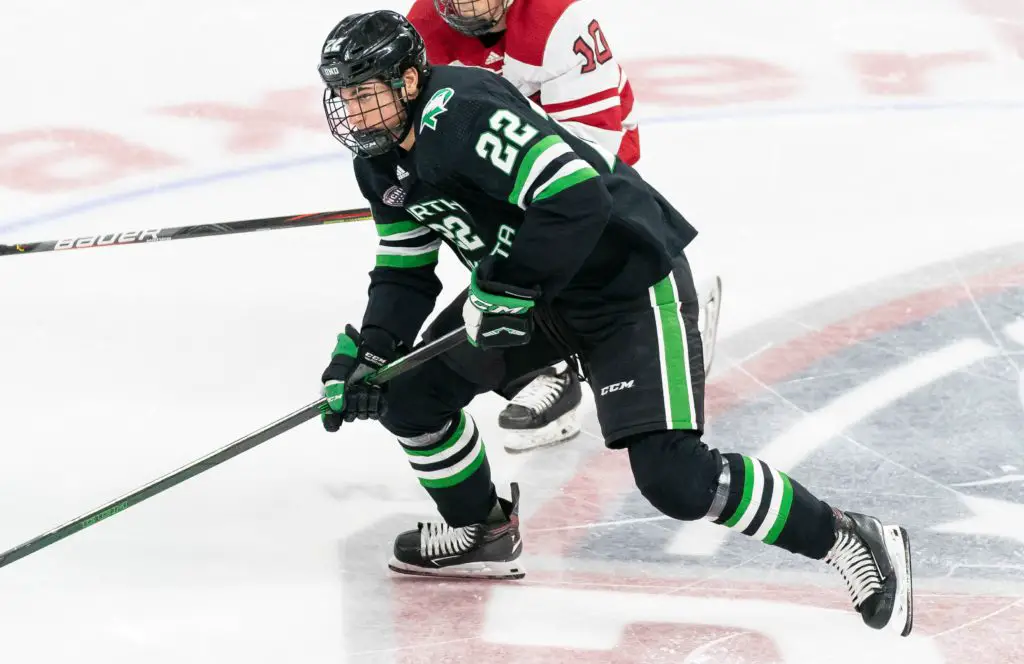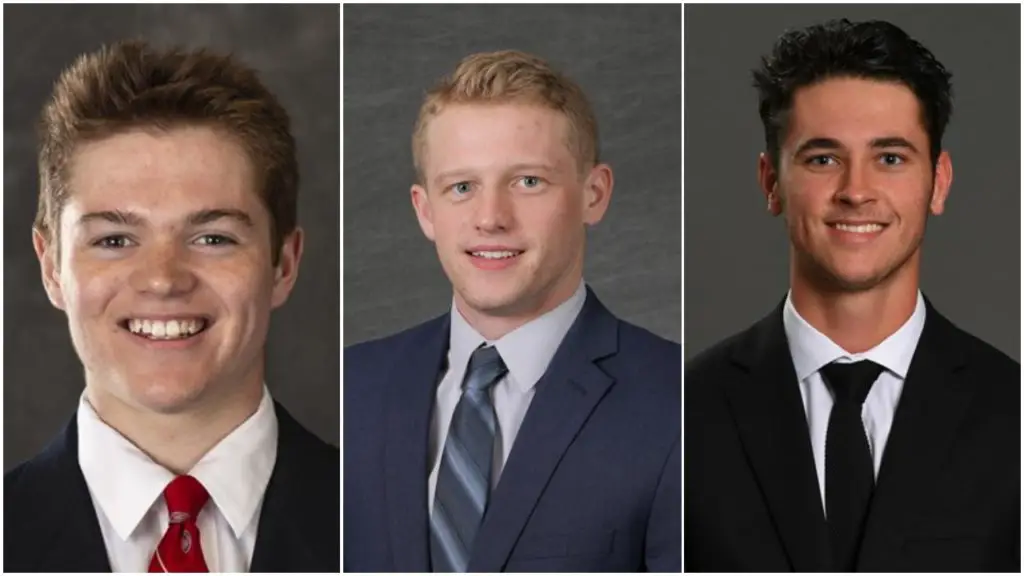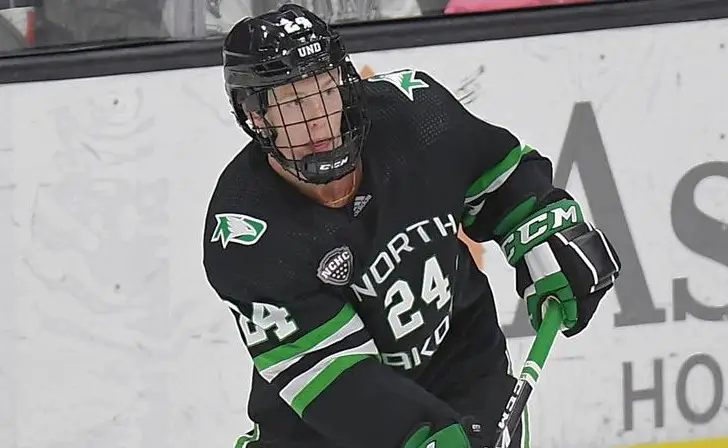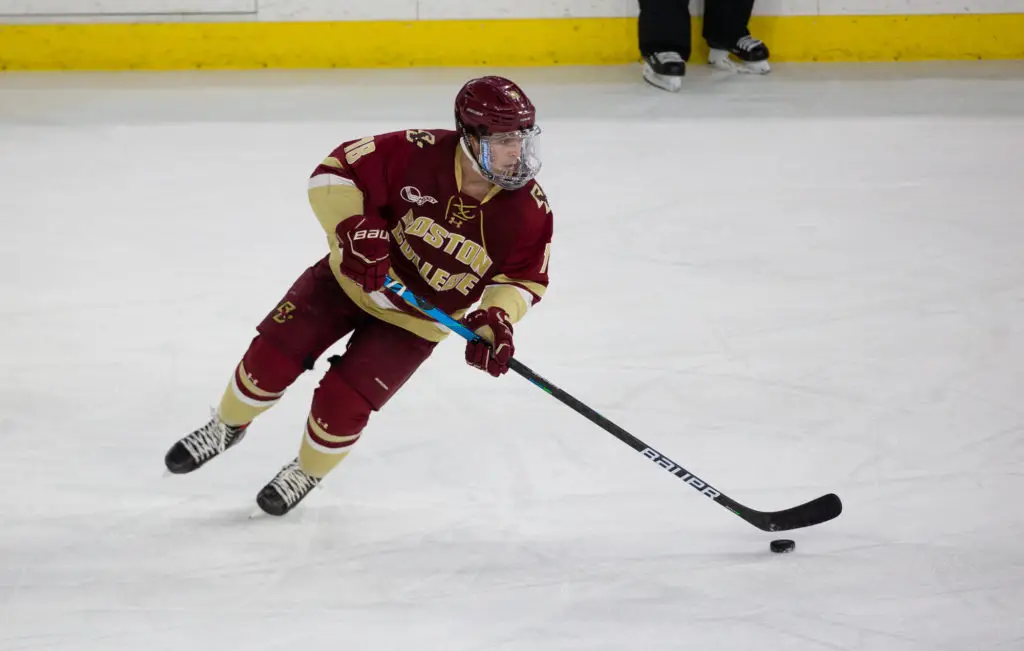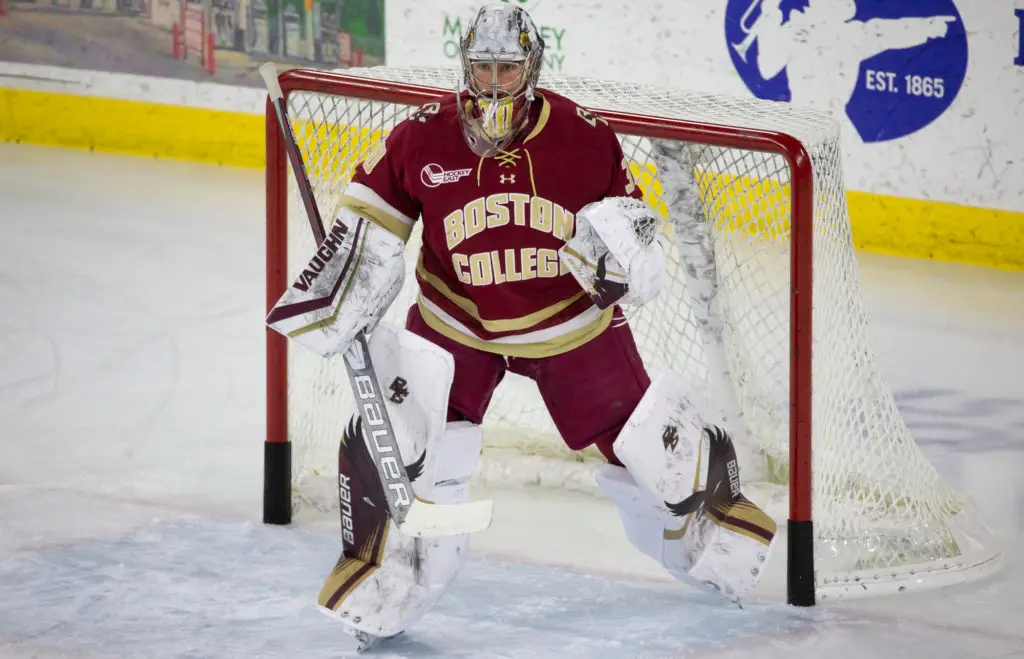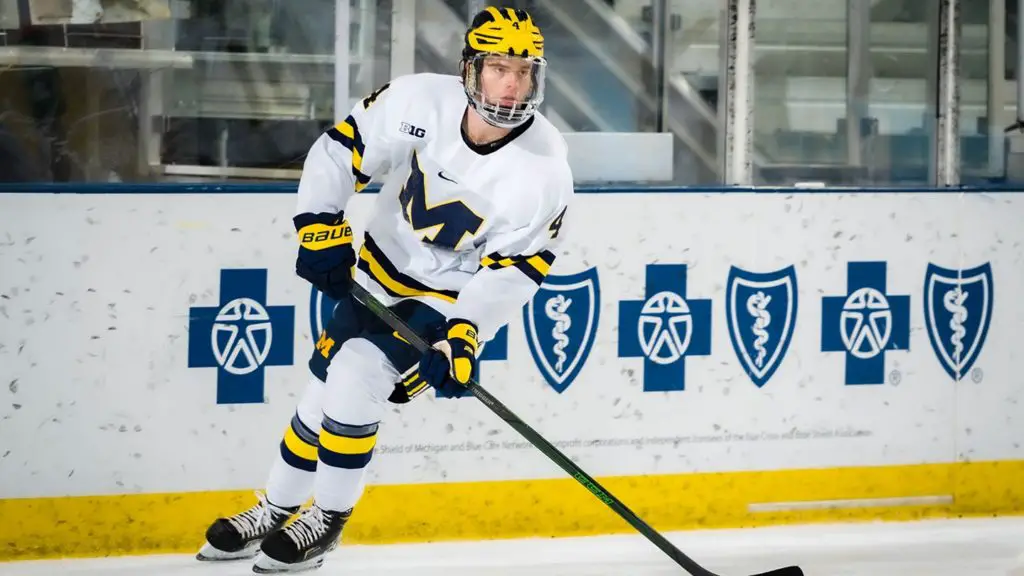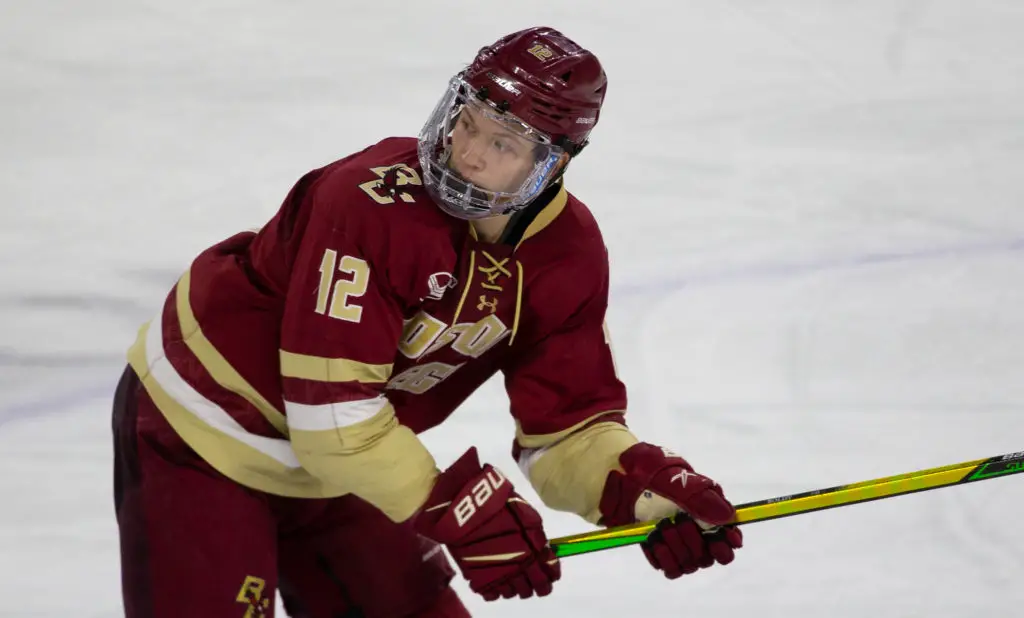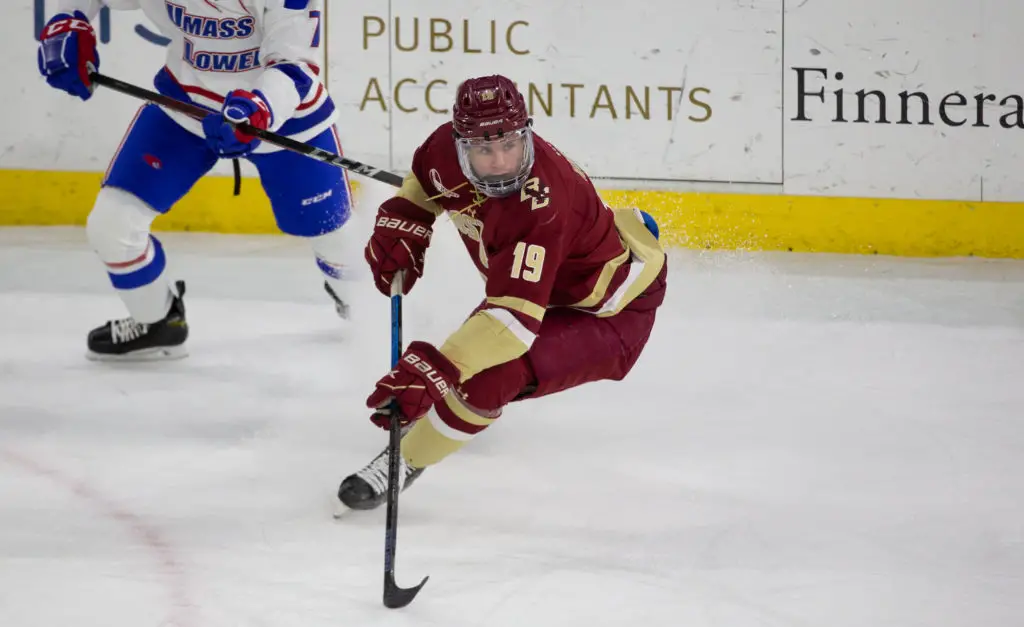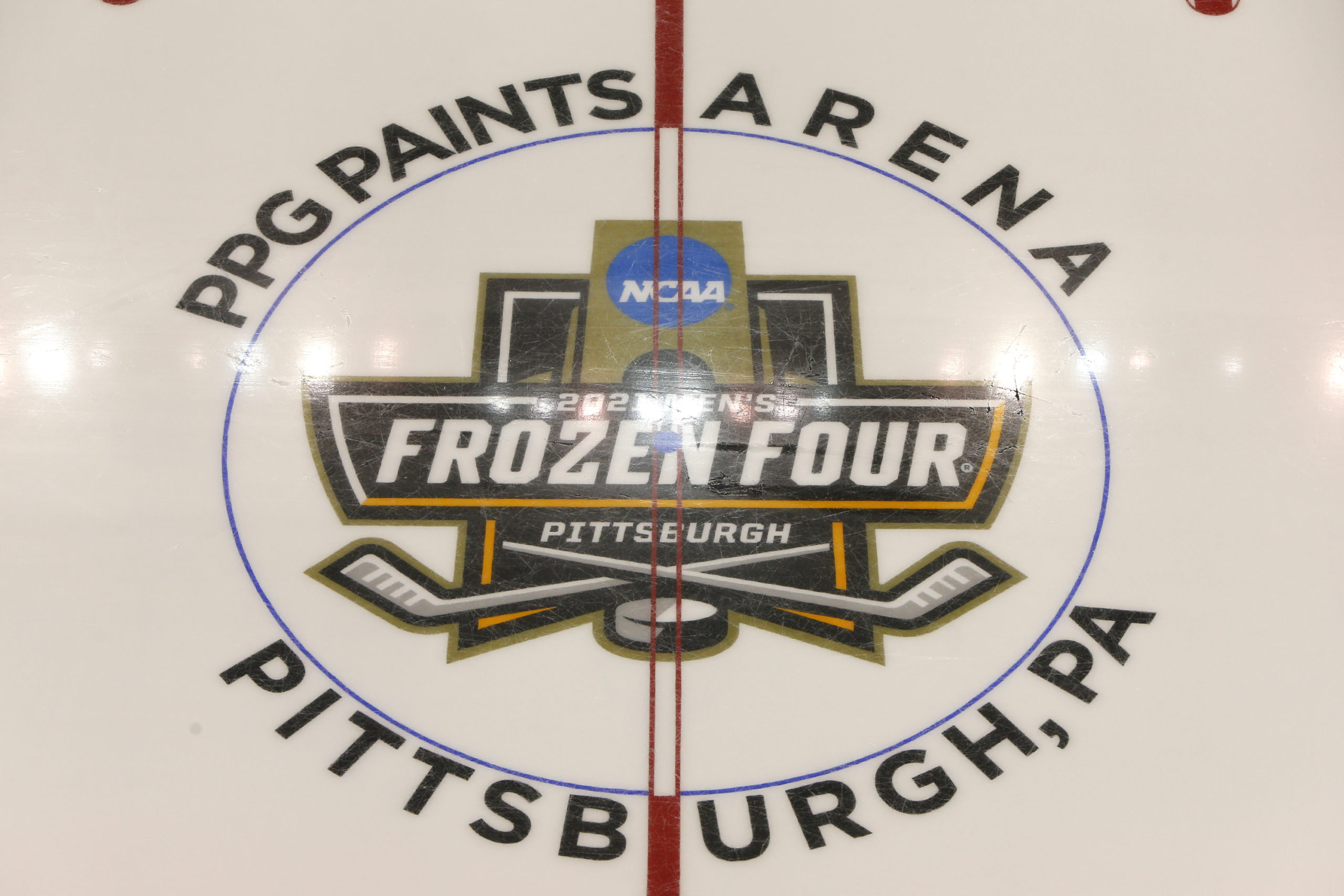
Complete coverage of the 2021 NCAA Men’s Frozen Four

Women’s Division I College Hockey: 2020-2021 All-USCHO Teams

Twelve different programs are represented on the All-USCHO Women’s Division I teams this year. Northeastern and Wisconsin lead the way, each placing four players on our lists.
First Team
F: Daryl Watts, Sr – Wisconsin
F: Danielle Serdachny, So – Colgate
F: Alina Mueller, Jr – Northeastern
D: Ashton Bell, Sr – Minnesota Duluth
D: Skylar Fontaine, Sr – Northeastern
G: Aerin Frankel, Sr – Northeastern
Second Team
F: Chloe Aurard, Jr – Northeastern
F: Grace Zumwinkle, Sr – Minnesota
F: Caitrin Lonergan, Sr – Clarkson
D: Grace Bowlby, Sr – Wisconsin
D: Cayla Barnes, Jr – Boston College
G: Emma Söderberg, Jr – Minnesota Duluth
Third Team
F: Anna Klein, Sr – Minnesota Duluth
F: Emma Maltais, Sr – Ohio State
F: Sophie Shirley, Jr – Wisconsin
D: Sophie Jaques, Jr – Ohio State
D: Emily Curlett, Sr – Robert Morris
G: Loryn Porter, Sr – Maine
Rookie
F: Jamie Nelson, Fr – Minnesota State
F: Lacey Eden, Fr – Wisconsin
F: Kiara Zanon, Fr – Penn State
D: Nicole Gosling, Fr – Clarkson
D: Riley Brengman, Fr – Ohio State
G: Josie Bothun, Fr – Penn State
Women’s Division I College Hockey: Northeastern’s Aerin Frankel named 2020-21 USCHO Player of the Year
Northeastern goalie Aerin Frankel is the 2020-21 USCHO Player of the Year.
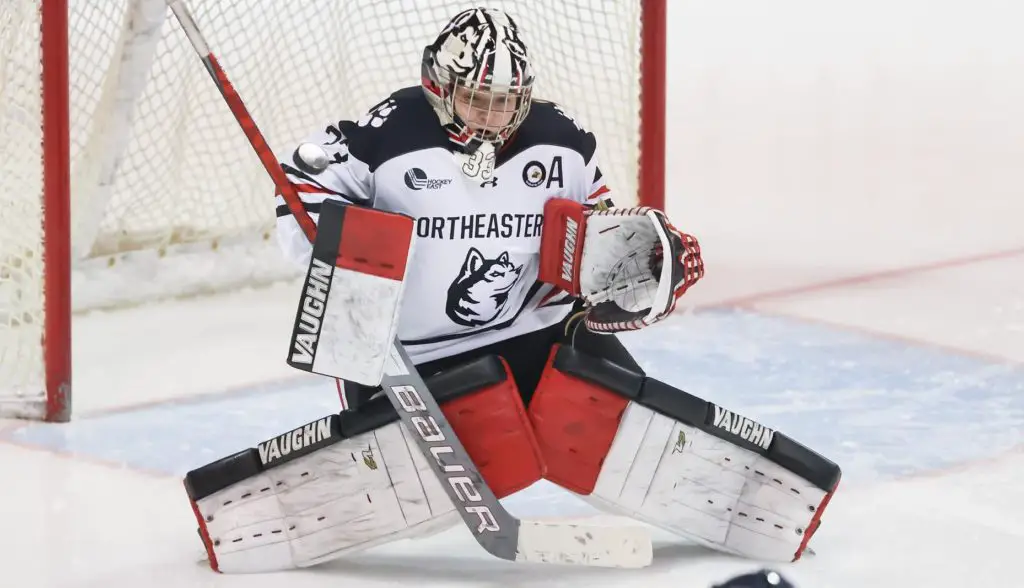
The case for Player of the Year was not as clear cut this season. We went back and forth on who we thought deserved this honor this year. What we came back to is that the final two teams likely would have made it to the championship game had they not had their top scorers in Daryl Watts and Alina Mueller – the other two players we talked about as contenders. However it’s far less certain that Northeastern plays in their first-ever title match without Frankel in the net.
That is said with all due respect to her teammates, who are phenomenal. At the micro level, Frankel kept them in the semifinal game as they struggled to adjust to UMD’s speed and pace of play and gave them a chance to mount a comeback to win the game.
At a macro level, Northeastern’s style of play evolved because of her solid presence in net. The Huskies have been able to push pace – at even strength and on the penalty kill – because they had absolute faith in her between the pipes. Skylar Fontaine and the rest of the Huskies’ defense are able to play more involved roles in the offensive zone because they aren’t afraid of giving up quick transitions and breakaways.
For her phenomenal season, Frankel was named Hockey East Player of the Year. Statistically, she led the country in goals against average (0.81), save percentage (.966), wins (20), winning percentage (.891) and shutouts (9). Her goals against average was good for third best season in NCAA history.
The two-time First-Team All-American holds Northeastern career program records in games played, minutes, goals against average, save percentage, shutouts, and wins. A three-time Hockey East Goaltender of the Year and MVP of the Hockey East Championship, Frankel’s career save percentage .947 is tied for second all-time in NCAA history.
Frankel set a new standard at Northeastern and in Hockey East, and is one of the most accomplished goaltenders of the past decade. Having her in net is the building block upon which Northeastern’s current success has been built.
Johnson, Somoza use COVID-19 extra eligibility to return to Bemidji State for 2021-22 college hockey season
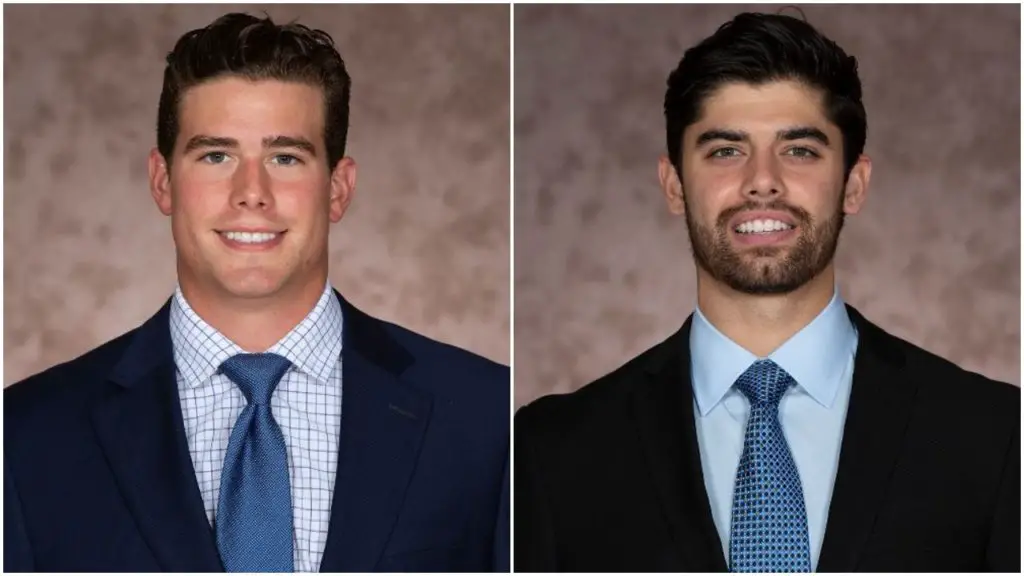
Bemidji State seniors Brad Johnson and Ethan Somoza will return to the Beavers for the 2021-22 season.
While both players have exhausted the traditional four years of eligibility, due to a COVID-19 delayed start and condensed 2020-21 season, the NCAA has given seniors the opportunity to take an additional year of eligibility.
Johnson and Somoza will complete their business administration curriculum and pursue MBA degrees while returning to the Beavers for a fifth season.
“We are excited that Brad and Ethan have the opportunity to come back next year to lead our team and better themselves by continuing their education,” said BSU coach Tom Serratore in a statement. “To have high-end leaders like these two back in our room next year is huge and will give us an edge as we move to a new league and look to build on our 2020-21 NCAA tournament season.”
Traditionally, a student-athlete has five years to play four seasons of their sport. Because the pandemic impacted the 2020-21 winter season in ways that nobody could predict, the NCAA granted all winter sport athletes an extra year of eligibility. The extra year means current college student-athletes have six years to play their four seasons. This also means that student-athletes can compete in all or a portion of the 2020-21 season, but it won’t be counted against their years of eligibility depending on their division level specific eligibility rules.
“To be able to come back and get the full experience and play a full schedule for my senior season is an exciting opportunity,” said Somoza. “I think we have a really good group coming back. I want to be a part of this team for as long as I can and lead it as far as I can. We got a taste of the tournament this year. Now we want more.”
Somoza is the first native Californian to wear the ‘C’ for the Beavers. He posted 20 points on a team-high 15 goals and five assists in 29 games for the Beavers in 2020-21.
In 133 career games with Bemidji State, Somoza has 27 goals and 29 assists for 56 points.
“Looking back at last season and all the extra issues we had to deal with because of COVID, our team was still able to have success,” Johnson said. “To be able to come back and compete again with this special group of guys is a great opportunity. Also, being able to complete my MBA at Bemidji State will open doors for me in whatever career path I choose. I am grateful for the opportunity.”
Johnson was among BSU’s top four defensemen in all 29 of BSU’s games as a senior. He recorded three goals and matched a career high with seven assists. His 10 points were good for third among BSU blueliners and eighth on the team in scoring.
In 115 games on the BSU blue line, Johnson has 12 goals and 17 assists for 29 points.
Hockey Humanitarian Award finalist spotlight: Union’s Kosack finds community niche with youth-driven outreach campaign
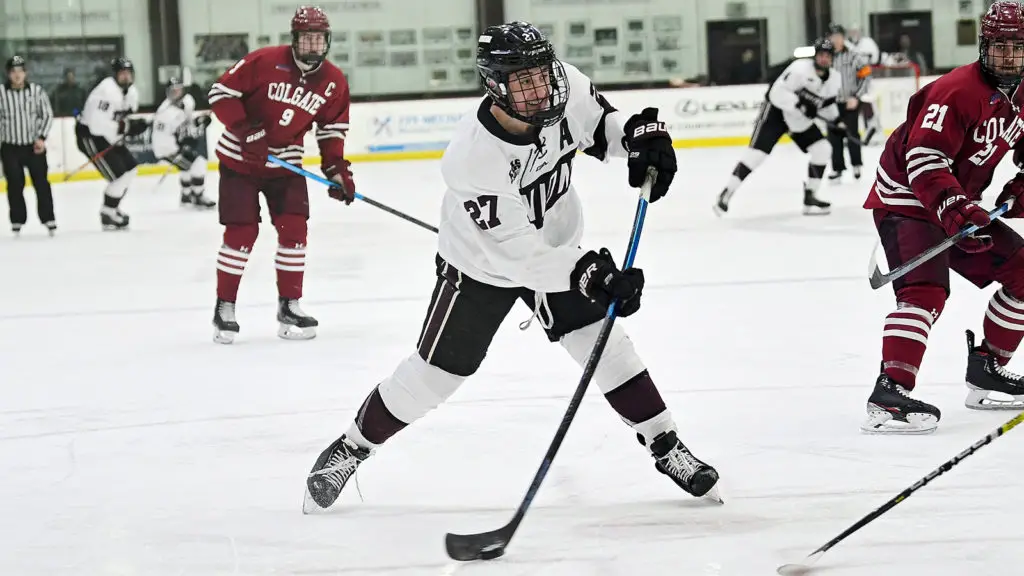
Growing up, Union senior captain Josh Kosack remembers being that kid banging on the glass at hockey games.
A chance encounter two years ago at an away game gave him the chance to return the favor – and then some.
While warming up prior to a game at Dartmouth in February 2019, Kosack exchanged greetings with a young fan sitting along the ice.
“I didn’t really think too much of it; I was talking to him between periods and giving him props. I gave him a puck and I thought that was it,” Kosack said.
But when Patrick Toner’s mother emailed Union president David Harris to mention the impact such a small gesture had on her son, Kosack thought he might be on to something.
“It put into perspective how easy it was to make a difference,” Kosack said. “I just decided to make something out of it. I realized the platform that we have as college athletes. If someone gave me a puck as a kid, I’d be star-stuck. I wanted to give back and put a smile one someone’s face.”
That was the impetus for starting Kozi’s Kids, a group run by Kosack that helps distributes Union hockey tickets to local children and their families. Each player is allotted a certain number of tickets per game, but the Dutchmen’s roster is made up of players from all over the map, meaning that their families can’t always attend every game.
That generosity, along with his other community service work in Schenectady, N.Y., led to Kosack being nominated as one of the three finalists for the Hockey Humanitarian Award.
“It was very gratifying to get nominated,” Kosack said. “It shows the bigger picture of the impact that I’ve had with those kids.”
Kosack works with COCOA (Children of Our Community Open to Achievement) House, a non-profit organization founded by a Union student in 1996 that promotes academic success and offers expanded opportunities for at-risk youth in the Schenectady community. Kosack arranged for transportation and gives the children a tour of the locker room before the game. Many of the children have never been to a college hockey game before.
Growing up, Kosack spent his summers working at hockey camps.
“I always had a passion for helping out younger kids,” he said.
But he had never launched a project of this magnitude.
“This wasn’t just something that he just winged together in the summer,” Union coach Rick Bennett said. “It was during the year, while doing two full-time jobs with school and hockey.”
In November, Union announced that it was cancelling its season due to the COVID-19 pandemic, meaning that Kozi’s Kids was put on hold last winter, but that didn’t stop Kosack, who still made an impact even without a season.
“I was bummed four about 10 minutes and then I talked to my dad about it,” he said. “I just kind of realized that it’s not the end of the world. Lots of people have it worse off. I kind of kicked into gear and asked, ‘How am I going to grow from this?’”
It didn’t take him long, as Kosack and co-captain Sean Harrison ran a coat drive in December for the Schenectady City Mission.
“I meant to print off 30 flyers but I printed 300 by accident so I spent two hours hanging them around campus,” Kosack said.
It worked, as the coat drive ended up getting 100 coats in 48 hours, which he called “unreal.”
Kosack also wanted to make sure that he didn’t forget about the kids at COCOA House, even without any games for them to attend.
“Lots of kids loved coming to the games. I wanted to say, ‘Don’t worry, I didn’t forget about you guys,’” Kosack said.
He did that by starting a GoFundMe campaign to collect money for Christmas presents for the kids. The campaign raised more than $5,000.
Those actions after his season was cancelled spoke volumes for his Bennett.
“Being told that your season has been cancelled and to still follow up on what you said you were going to do for your community service, to me that speaks loudly about a person’s character,” Bennett said. “Do you follow up on what you said you were going to? And he did.”
In addition to being nominated for the Humanitarian Award, Kosack is a finalist for the ECAC Hockey Student-Athlete of the Year award and a valuable leader on the ice for the Dutchmen.
“In the fall, when we were going through whether or not we were going to play or not, he did a tremendous job working with our first-year class and setting the tone,” Bennett said. “It was really impressive.”
Kosack, who withdrew from Union for the last two semesters this season to maintain his athletic eligibility, plans to play his final collegiate season next year and continue with Kozi’s Kids.
With any luck, he might be able to snag a couple of recruits for the Dutchmen.
“A lot of these kids didn’t know what hockey was,” he said. “Now some of them have told me their dream is to play for Union one day.”
Women’s Division I College Hockey: Penn State’s Josie Bothun named 2020-21 USCHO Rookie of the Year
Penn State goaltender Josie Bothun is the 2020-21 USCHO Rookie of the Year.
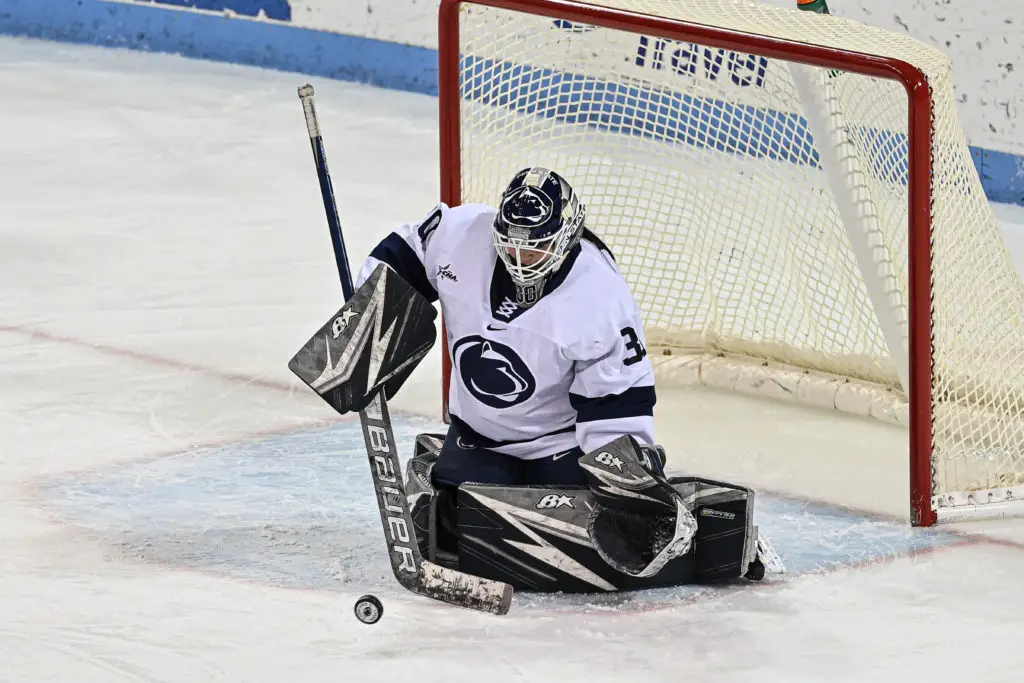
Bothun was part of a nine-member freshmen class for the Nittany Lions that was as impactful as it was deep. She and classmate Annie Spring were the only goalies to see action for PSU, with Spring playing one period and Bothun playing all the rest. The other seven rookies were skaters, all posting five or more points, and all playing in at least 13 of the team’s 21 games. The freshmen combined for 88 of the squad’s 195 points and 34 of its 72 goals.
Foremost among the skaters was forward Kiara Zanon, who led all rookies with 30 points. That total also paced her team, and Zanon led Penn State in assists, shots on goal, and plus/minus as well. Zanon’s season earned her the honor of National Rookie of the Year, and she could easily have won USCHO’s rookie award and been a worthy recipient.
So why didn’t she? While what Zanon accomplished was impressive, the strides made by her team in this unusual season were even more so. A program that had only once managed a winning record, that by a single game in its third season of existence, managed a lofty 81 percent winning percentage.
Bothun earned all 16 wins, the most in a season by any Nittany Lions netminder, and only one shy of the team’s highwater mark for wins. That was accomplished in a full season, which this surely wasn’t.
Penn State had previously never finished higher than third in College Hockey America or reached double digits in league wins, but took this season’s CHA crown thanks to those 16 victories. As impressive as the campaign was, the Nittany Lions nearly rose to a whole other level. After clinching the title on February 26 with a convincing 5-2 triumph over Mercyhurst, they had only tasted defeat once through 19 contests.
Perhaps a young team got a bit complacent. They started slowly the next day and fell into an early two-goal hole, but rallied, only to lose in overtime. Six days later, another lackluster start against Syracuse in the conference semifinal doomed the Nittany Lions to a second straight defeat. When the NCAA Selection Committee chose to spurn the team that had the second-best record in the country, a dream season was quickly and shockingly over.
What better way to honor a historic Penn State team than to give a nod to the goaltender that was on the ice for all but 23:33 of it?
Individually, Bothun turned in a season that was statistically noteworthy. Her goals against average was second only to Aerin Frankel and the best in program history for any goaltender playing at least two games. Bothun ranked in the top five nationally in save percentage, winning percentage, and shutouts.
Due to the impact of Covid-19 on the sport, the entire hockey world had to adjust in 2020-21 – to games played without fans, with an uncertain schedule, and following unprecedented protocols. Bothun needed to acclimate to playing with and against females again, after a couple of seasons with the Forest Lake High School boys’ team.
Now that she’s at home in State College, surrounded by talented teammates, and having four years of eligibility remaining while already boasting 16 career wins, who knows what kind of assault she can wage on the record books. Bothun and her teammates may have missed out on this year’s NCAA Tournament, but it’s safe to predict that she will get to participate in it before her career is complete.
Until then, in recognition of what she and her Penn State teammates accomplished, Josie Bothun is this year’s USCHO Rookie of the Year.
Women’s Division I College Hockey: Wisconsin’s Mark Johnson named USCHO Coach of the Year
It’s impossible to compare teams and seasons and national title runs, but Wisconsin coach Mark Johnson said shortly after the final buzzer of the title game that the 2021 National Championship was the most exhausting and difficult one he had ever experienced.
And he has experienced many. With his team’s win this year, he became the only DI women’s hockey coach to win six titles – the Badgers were the last team standing in 2006, 2007, 2009, 2011, 2019 and now in 2021.
A bench boss that rarely shows emotion – good or bad – he was visibly stunned and then ecstatic when his team took the title in overtime thanks to an improbable goal from behind the net by Watts.
UNREAL OT GOAL TO WIN THE NATIONAL CHAMPIONSHIP! ? @BadgerWHockey ? pic.twitter.com/VEqDxZPOCm
— espnW (@espnW) March 21, 2021
“It’s never easy, but we stuck with it,” he said on the tv broadcast immediately after the game. “It’s been a wonderful year, but a challenging year.”
This unprecedented season presented difficulties for every player, coach and staff member on every team whether they took the ice this season or not. Having the 2020 season get shut down in its final two weeks was the mostly unspoken – but ever-present – pall hanging over everyone as they knew that despite all the accommodations, testing and precautions they took, it could all end at any moment.
Through that all, the Badgers were ranked first or second the entire season, won the program’s ninth WCHA regular season and playoff crowns and advanced to their record seventh-straight Frozen Four before earning their sixth title – tying them for most NCAA championships with Minnesota.
Johnson and his staff have created and cultivated a culture of excellence and winning at Wisconsin. His players past and present rave about playing in Madison and learning from him. The success of former Badgers on and off the ice tell the story of Johnson’s far-reaching impact on women’s hockey. He is both a legend and just their coach.
In his 18th season behind the bench for Wisconsin, Johnson the all-time winningest coach in Division I women’s hockey history with a career record of 539-95-47. He earned his ninth WCHA Coach of the Year award this season.
This was a Wisconsin team that thrived in the third period and overtime. They seemed to rise to the occasion again and again in ways they didn’t quite muster in earlier periods of the game. Whether it was a flair for the dramatic or a different type of motivation, Johnson’s team got it done late in the game, scoring 37 of the team’s 77 goals this season in the final frame of the game.
Opponents scored just nine of their 32 goals against them during those periods. The Badgers played in six overtime games this season and went 4-1-1 and captured the regular season title, the WCHA tournament title and the national championship with overtime wins.
Experience matters. Going into the title game, Wisconsin were the defending national champions who were more comfortable on the biggest stage. But that wasn’t ultimately the experience that mattered. They also had faced more do-or-die scenarios this year and come out on top. The coaches believed in them and they believed in themselves and that certainty, captain Brette Pettet said, was what carried them to the title.
The team was fast and deep and even-keeled. They got scoring from across their lines. They adjusted and adapted – to their teammates, to their opponents and to the circumstances. They were prepared, but not cocky. They won when they had to.
They bent, but they did not break.
For all these reasons and more, Wisconsin’s Mark Johnson is the 2021 USCHO Coach of the Year.
Hockey Humanitarian Award finalist spotlight: UMass Boston players’ Men In Blades initiative keeps charities rolling in donations
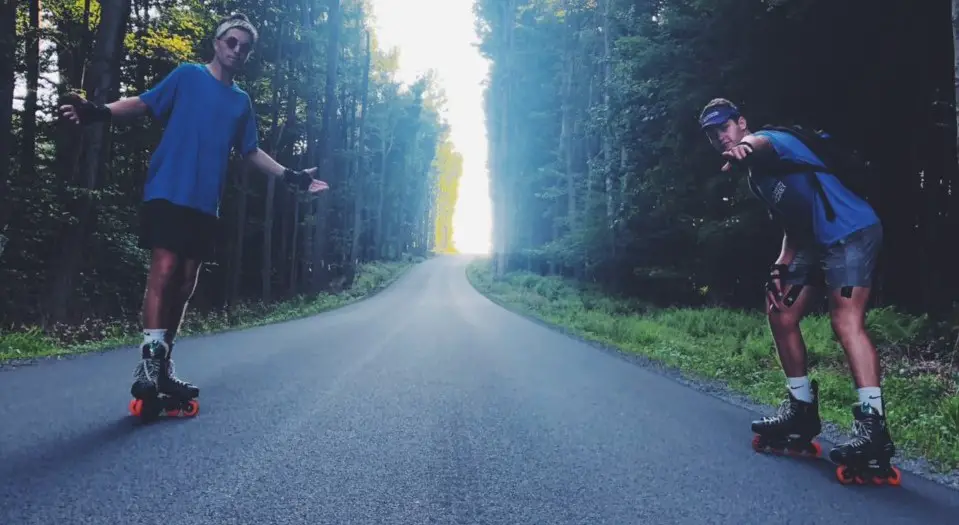
What started out as a brainstorming conversation between two UMass Boston hockey players became a goal and a purpose for supporting the American Cancer Society during the pandemic.
Not to be confused with Will Smith and Tommy Lee Jones’ “Men in Black,” Men In Blades (MIB) was born when teammates Jake Adkins and Andrew Walker wanted to come up with a meaningful way to help support cancer patients, many of whom were struggling to get care during the COVID pandemic.
MIB intended to help support those in need by raising donations through a 900-mile rollerblading adventure from Boston to Andrew’s hometown in Mason, Mich.
“As freshmen, we learned a lot from watching Dakota [Keene] and his charitable endeavors and talked with him about how to organize our plan,” said Walker. “It all started with discussions in our rooms and quickly became an obsession and focus about how we could do this. We are both STEM (Science, Technology, Engineering and Math) guys, so we figured the best plan was to roller blade from Massachusetts to Michigan. We didn’t quite figure out the endurance and topography around skating the 900 miles or what turned out to be 100 miles per day for nine days.”
The cause was the easy part of the equation as both Adkins and Walker had seen first-hand the impacts of battling cancer with dear family members and friends including Adkins’ mother, who has survived two battles with cancer.
There was the underlying concern and focus about raising funds to support ACS, especially during the pandemic to keep needed services and treatments available for patients battling cancer. Their battle on the road was going to prove to be much more than either of them had considered when masterminding the plan.
“It was just four of us with a camper,” said Adkins. “We didn’t consider the elevation changes on the roads which was a bit of a miscalculation because our rollerblades have no brakes. There were a lot of uphills and downhills in the first week. The uphills weren’t so bad, but the downhills were challenging in trying to avoid falls or running into things. We quickly adapted to put our vehicle in front of us on the hilly sections so that we could use it to slow down on some of the descents.
“I think we both lost 15-20 pounds with the intensity of the skating every day and couldn’t eat enough calories for what we were burning with the 100 miles per day. We would eat about six or seven times – full meals during each day, and we still lost weight.”
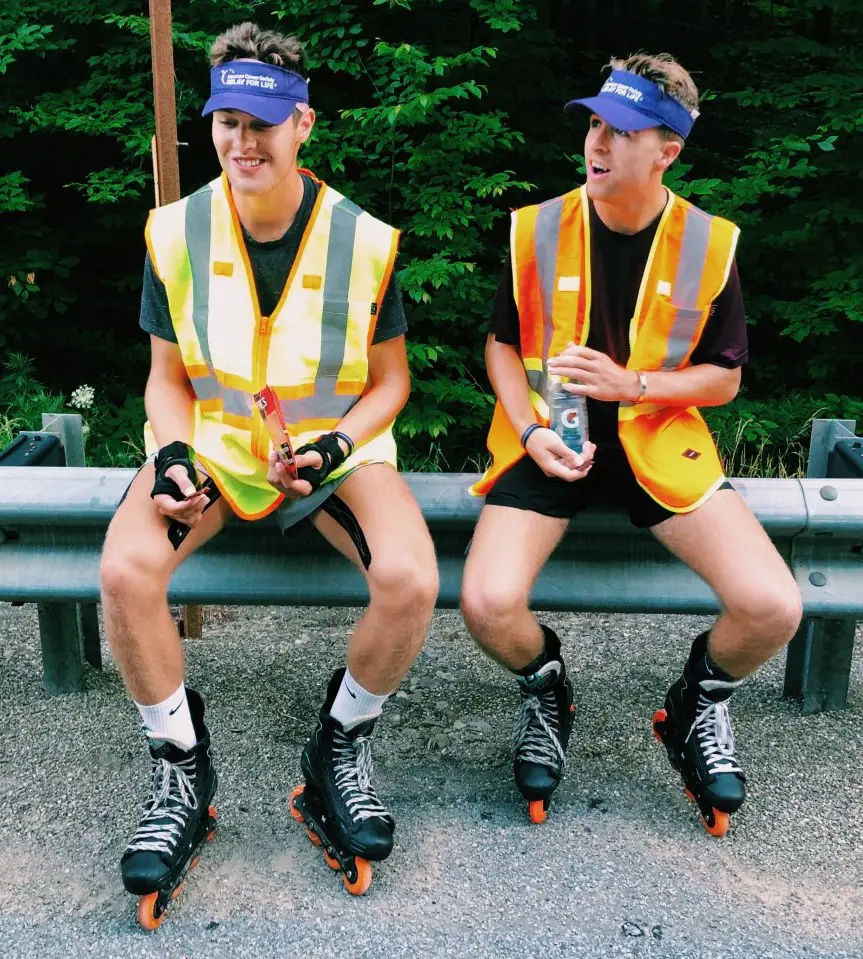
MIB began their daily ultra-marathon very early each morning trying to beat the heat of the summer days. Physio tape became a growing part of their daily wardrobe. There were times it was so hot on the road that the tar seemed to melt around their wheels and on at least one occasion, they were the traffic jam on local access roads. Their cause garnered more and more awareness as they traveled west, and that knowledge helped them with some needed police escorts at times to keep the MIB convoy moving.
Among the well-oiled MIB team, there was a much-needed physical therapist to keep the boys on their blades as well as their trusted social media guru and USA Hockey intern, Sidney Binger. Sidney kept the MIB trek front and center on the many social media channels and garnered the attention of the NHL as well as the Mario Lemieux Foundation.
Their goal of raising several thousand dollars quickly ballooned as different contributors across the hockey world backed their road trip on skates. Ultimately, the boys captured $30,000 in contributions for the American Cancer Society and brought attention to many local charities along their journey across the different states heading into Michigan.
“Sidney and I were best friends growing up,” said Walker. “We were lucky that she had some time away from her intern position with USA Hockey due to the pandemic – she was the social media master. It really was amazing how the hockey world rallied to our cause and helped us greatly exceed our goals. It feels great to help out a lot of people who need the support to continue their battle against cancer.”
JOIN THE 2021 USCHO NCAA COLLEGE HOCKEY BRACKET CHALLENGE
MIB has not stopped their fundraising activities just because their rollerblading a third of the way across the country ended over the summer. The MIB franchise is something that Adkins and Walker are committed to maintaining as part of their ongoing balancing of school, hockey and charitable endeavors.
They maintain a website not only for continued contributions but also for planned future fundraising activities that are already in the works. Like the movie franchise, there are plans for MIB2 activities to support charities and groups in need.
“We have a lot of ideas,” said Adkins. “We had planned a 3-on-3 pond hockey tournament for the Frog Pond in the Boston Public Gardens but had to postpone our December timing due to COVID. Right now, we are supporting the AJ Quetta Foundation by selling bracelets and t-shirts to raise money for the local high school hockey player that suffered a serious spinal cord injury this year. We see a lot of opportunities to keep the MIB active and we are proud to be helping.
“The Hockey Humanitarian Award nomination is really amazing, and it is an honor to be recognized – we want to keep this going to contribute as much as we can to the charities where we can help.”
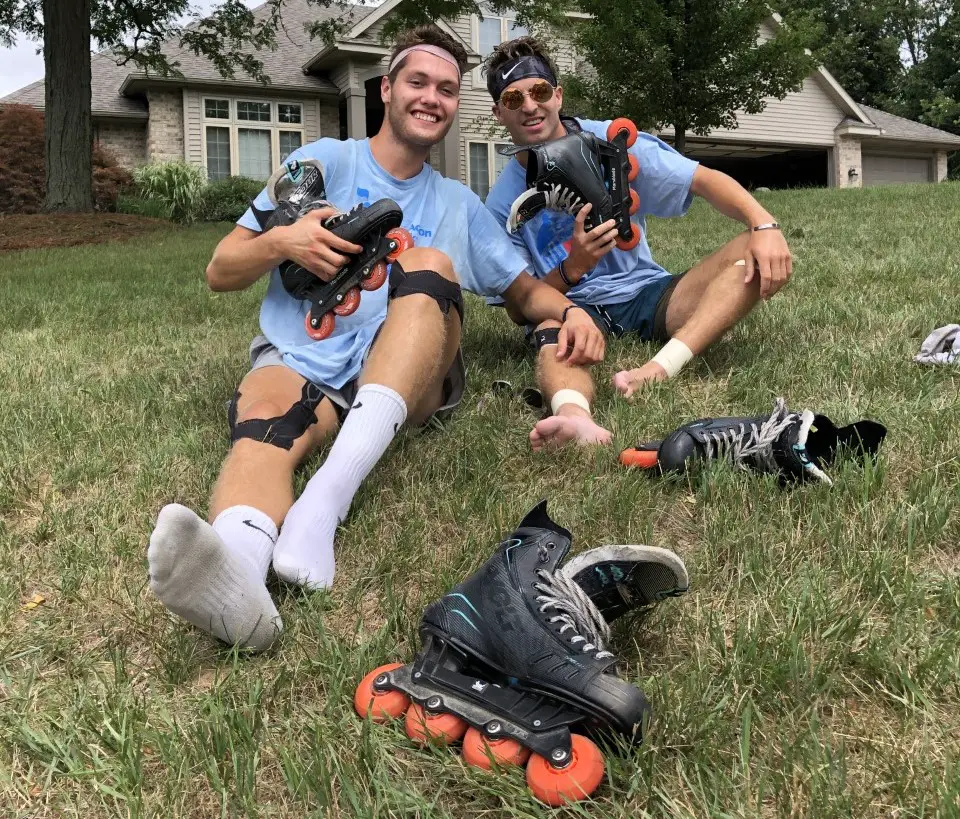
So is there another marathon skate planned for MIB? Not according to Walker, who thinks their next sanctioned event will be with a larger scale of participants and a much shorter route to travel.
“We are planning a 10-mile rollerblading event in the upcoming months,” Walker said. “We would like to reschedule the pond hockey event next winter but will look for a lot of participants to join our 10-mile event. I think we still have several sets of wheels we never needed for the trek last summer so we can put those to good use and enjoy a much shorter route for a good cause.”
His partner on wheels couldn’t agree more.
“I am so glad we didn’t pick my hometown to skate to,” joked Adkins. “Centennial, Colorado would have been way too much – a ten-miler sounds pretty good.”
Mustangs hoping to finish it on the ice
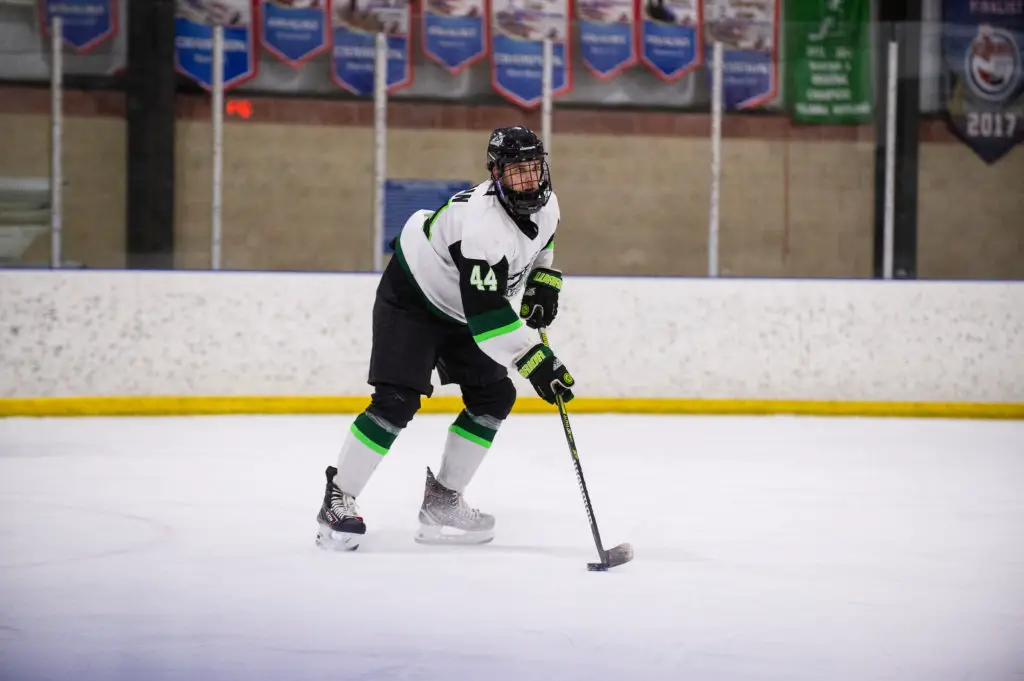
As the only conference playing for a championship in the east, the UCHC has worked through all the challenges of playing a hockey season during a pandemic. Adjustments on many scales have been made and as the season winds down to the playoffs beginning this week, the Stevenson Mustangs are a serious contender that hopes the title can be won where it belongs – on the ice.
“It was been a crazy season,” said head coach Dominick Dawes. “We have a really young squad that has been committed from the fall to play and grow as a team. As coaches, I think across the league we all get it and are living the challenges every day. After finishing our one remaining regular season game this weekend against Nazareth, we are locked into the top two spots with Utica. Eight teams will be in the playoffs with consideration to travel restrictions before we branch out a little wider for the semifinals and final. The quarterfinals will be next Wednesday with the semifinals on Saturday and the championship game on the Monday after Easter. With everything our team is through we are focused on the title and we all hope we can finish this the right way on the ice.”
Following the game with Nazareth, a 6-3 win, Stevenson is 10-2-1 overall and 7-1-1 in UCHC play giving them 22 points and an .833-win percentage in the league. Some might find the strong results a bit surprising considering the make-up of the roster which boasts 15 freshmen skating regularly and three of them amongst the team leaders in goals and points.
“They were good players before they got here to Stevenson,” said Dawes. “We have given them the opportunity to play and to make mistakes as part of their development. They have matured quite a bit because of being put in all kinds of different situations. It is great to see the growth and the results come together for what is still a young program here.”
Among the outstanding newcomers are forwards Mac Lowry and Eric Olson along with defenseman Blake Colman. Lowry leads the Mustangs in goals with nine while Colman leads the defensive group with 12 points in 12 games played.
“Those three have adjusted well to the college game so far,” stated Dawes. “Our team continues to mature, and our six seniors have helped that growth. The team really has come together well through all of the challenges and enjoy their time together whether practicing or playing the games.”
Another factor in Stevenson’s success is the emergence of Ryan Kenny in goal. The sophomore has been solid in goal this season with an 9-1-1 record, .924 save-percentage and a 2.08 goals-against average. Kenny’s rock-solid play has garnered the attention of his teammates and boosted the confidence of a team hungry for a title.
“Ryan was thrown right into it last season as a freshman,” noted Dawes. “He has come in this season dialed-in and 100% focused. He is usually the first kid on the ice working on things and I believe the fall skills sessions were really helpful for him in preparation for the season. There is complete confidence in Ryan in the locker room and the team believes he gives us a chance to win every game.”
The final days of the sprint-like season are here at the end of March and the determination of playoff opponents and venues coming after the regular season concludes with or without make-up games lost to COVID protocols. By April 5, the 2020-2021 UCHC men’s ice hockey champion will be crowned.
“We haven’t changed our goals with the exception of not having a national tournament,” said Dawes. “We always compete for two championships – the MAC and the UCHC. We think we have wrapped up the MAC title which is our athletic conference with some other teams that playing the UCHC, and we are focused on winning the second championship. It would be a big step forward for this still young program. We have been flexible by necessity in adapting to schedules and circumstances many times outside our control. The administration and athletic departments across the league have found a way to enable us to play and be safe. Now the best ending possible would be for a champion to be decided on the ice in the next week. Hopefully we earn that opportunity.”
The title journey starts Wednesday afternoon when Stevenson hosts Neumann.
New Arizona State arena making progress, on schedule to open in 2022

The new arena being built for the Arizona State hockey team is making progress and staying on track to open in the fall/winter of 2022.
Last November, the new $115-million, 5,000-seat arena in Tempe was approved by the university’s Board of Regents’ Finance, Capital and Resources Committee.
Currently, the Sun Devils play at the 700-seat Oceanside Ice Arena in Tempe.
Started from the bottom now we're here. ?️@oakviewgroup @MAMortensonCo | #ForksUp pic.twitter.com/LMa6ZshMyW
— Arizona State Sun Devils (@TheSunDevils) March 30, 2021
